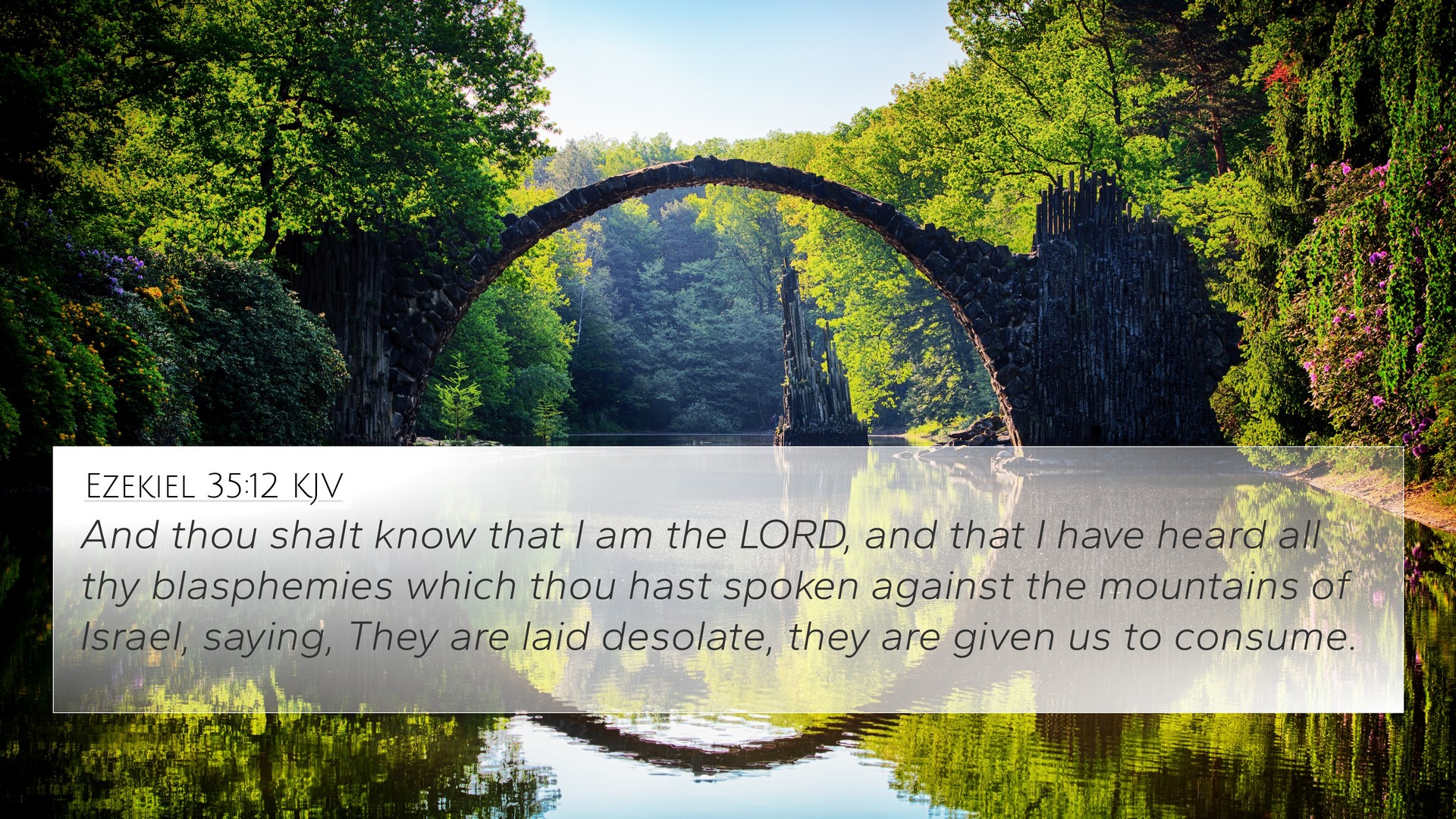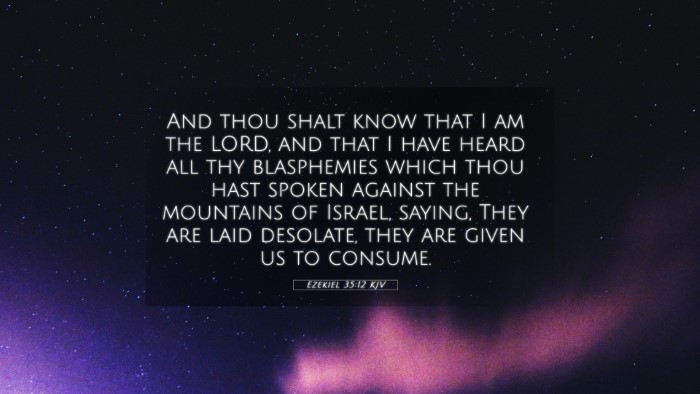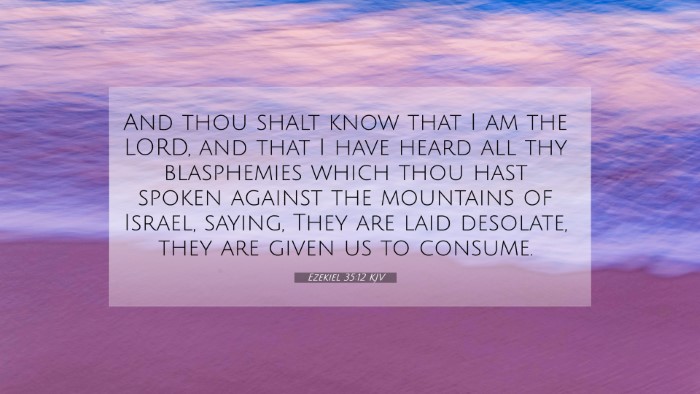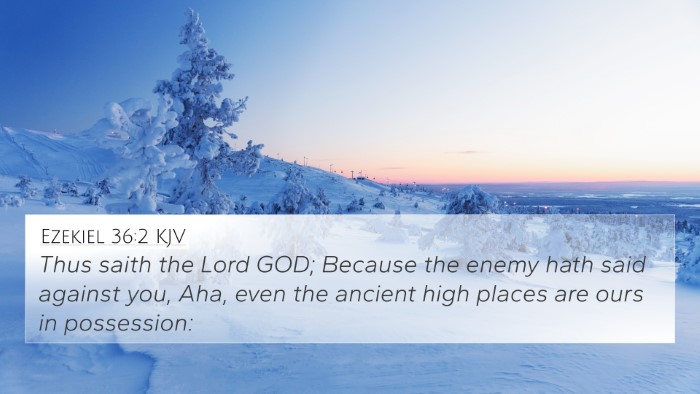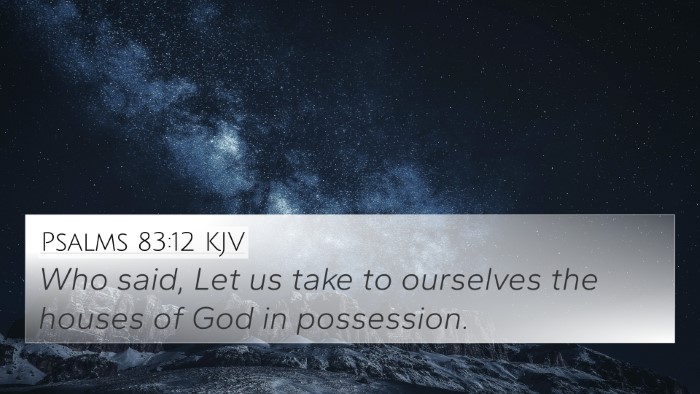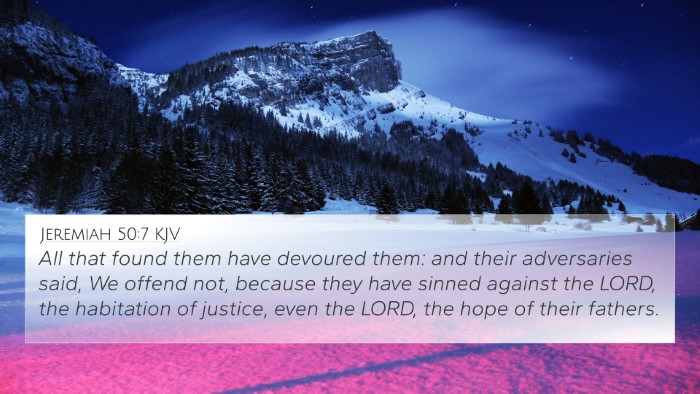Ezekiel 35:12 - Summary and Interpretation
Bible Verse: Ezekiel 35:12 - "And thou shalt know that I am the Lord, and that I have heard all thy blasphemies which thou hast spoken against the mountains of Israel, saying, They are laid desolate, they are given us to consume."
Meaning and Analysis
The verse from Ezekiel serves as a profound declaration of God's sovereignty and His awareness of human actions, particularly blasphemy directed at His chosen people, Israel. The interpretation draws from various public domain commentaries, which highlight several key themes.
God’s Sovereignty
- Matthew Henry: Emphasizes that God asserts His authority by reminding the people of His omniscience—He knows not just their actions but their thoughts and spoken words as well.
- Albert Barnes: Points out that this knowledge comes as part of God's judgment; He is attentive to the insults and blasphemies against His people, showcasing His protective nature over Israel.
- Adam Clarke: Notes that God’s acknowledgment of the blasphemies suggests a coming retribution and a corrective action that highlights His justice.
Blasphemy Against God’s People
- Understanding the Context: The blasphemies against the mountains of Israel suggest not only an attack against the physical land but metaphorically against God’s promise and His covenant with Israel.
- Comparative Exegesis: The verse can be cross-referenced with Isaiah 54:17, which speaks of no weapon formed against God's people prospering, and Psalm 3:1-2, where David expresses confidence despite numerous enemies.
Implications for Israel
- The Theme of Restoration: God's hearing of these blasphemies serves as a pivotal point for His assurance that Israel will not remain desolate forever. Commentary references frequently cite Jeremiah 30:17 for a parallel promise of restoration.
- Covenant Enforcement: The mention of "mountains of Israel" represents not just geographical mountains but the high points of Israel's identity and heritage, linking to Deuteronomy 32:13 where God leads His people to the high places.
Cross-Referencing Biblical Texts
To better understand Ezekiel 35:12, one can explore a variety of inter-biblical connections. Here are some notable cross-references:
- Isaiah 10:12 - speaks of Assyria’s pride and consequent judgment.
- Jeremiah 49:7 - discusses God’s judgment on Edom, linking to themes of arrogance.
- Romans 2:24 - Paul cites the blasphemies against God’s name due to the actions of His people.
- Revelation 11:8 - spiritual symbolic significance of Jerusalem, paralleling desolation.
- Ezekiel 36:3 - God’s declaration against those who blasphemed against Israel.
- Matthew 5:11 - Jesus speaks of blessing for those persecuted for righteousness.
- Micah 3:5 - the prophets were rebuked for leading people astray.
Tools for Bible Cross-Referencing
Exploring Further: There are numerous tools available for deep bible study, greatly enhancing understanding of verse connections. Utilizing a Bible concordance or a cross-reference guide can reveal thematic links and provide greater insight into passages that relate to Ezekiel 35:12.
Benefits of Cross-Referencing
- Allows readers to see a broader thematic and contextual understanding of scripture.
- Encourages deeper study and reflection on the interconnectedness of God's word.
- Aids in sermon preparation and theological discussions by providing a richer backdrop for understanding.
Conclusion
In summary, Ezekiel 35:12 serves as a critical reminder of the sovereignty of God over the disparagement faced by Israel. This verse invites reflection not just on the historical implications but also on the current state of believers and their responses to adversity. By engaging in Comparative Bible verse analysis and linking Bible scriptures, one can draw rich insights and reaffirm the overarching themes of hope, judgment, and restoration found throughout the Bible.
